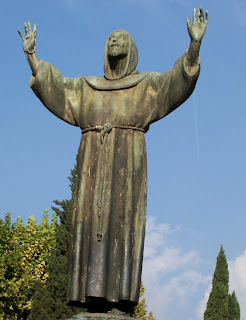Martyrs of Korea
 They are slightly dusty, but perhaps that is inevitable, neatly folded in a cupboard as they are. The scarlet tunics are not quite as red as they should be. What would be seen were they to be unfolded for all to see?
They are slightly dusty, but perhaps that is inevitable, neatly folded in a cupboard as they are. The scarlet tunics are not quite as red as they should be. What would be seen were they to be unfolded for all to see?
The ivory-coloured tunic is slightly grey. Does the patina of dust come through the locked cupboard door, which was never made to be air and dust proof? Who wore those tiny shoes? Did they belong to a child, perhaps only four or five years old? Was the same small individual the owner of both the slippers and the ivory satin tunic with its mandarin collar? Did they belong to St. Peter Yu Tae-chol, strangled in prison at the age of thirteen on October 31st, 1839?
What about the ‘much-loved’ rosary, tired and grey, heaped in one corner? At what stage was it separated from its owner?
...and the two ropes, carefully wound into a tidy knot. They look as though they were new...perhaps only used on one occasion? The dark brown shackles say nothing. Were they witness to more than we can ever imagine? What of the ring made of thick rope, the hole in its centre little more than the width of my clenched fist? Its greasy appearance is ominous, but in what way was it used?
These few mementoes, treasured in the chapel upstairs as I write, are tangible contacts with some of the Korean martyrs. The Catholic community suffered major persecutions in the years 1839, 1846 and 1866, producing at least 8,000 known martyrs. Among them were the fervent Korean priest Andrew Kim Taegŏn and the Korean lay catechist Paul Chŏng Hasang. The vast majority of the martyrs were simple lay people, including men and women, married and single, old and young. 79 martyrs of Korea were beatified in 1925 and 24 more were beatified in 1968 and the combined 103 martyrs have been canonized as saints, in 1984, with feast day September 20. Many of them experienced horrific torture before their equally agonising executions. Currently, Korea has the 4th largest number of saints in the Catholic world.
St. Andrew Kim Taegŏn wrote his last letter to his parish as he awaited martyrdom with a group of twenty persons:
"My dear brothers and sisters, know this: Our Lord Jesus Christ upon descending into the world took innumerable pains upon and constituted the holy Church through his own passion and increases it through the passion of its faithful....
Now, however, some fifty or sixty years since holy Church entered into our Korea, the faithful suffer persecutions again. Even today persecution rages, so that many of our friends of the same faith, among whom am I myself, have been thrown into prison, just as you also remain in the midst of persecution. Since we have formed one body, how can we not be saddened in our innermost hearts? How can we not experience the pain of separation in our human faculties?
However, as Scripture says, God cares for the least hair of our heads, and indeed he cares with his omniscience; therefore, how can persecution be considered as anything other than the command of God, or his prize, or precisely his punishment?...
We are twenty here, and thanks be to God all are still well. If anyone is killed, I beg you not to forget his family. I have many more things to say, but how can I express them with pen and paper? I make an end to this letter. Since we are now close to the struggle, I pray you to walk in faith, so that when you have finally entered into Heaven, we may greet one another. I leave you my kiss of love."
...but some of them left behind tangible links in the form of clothing, ropes, shackles, a rosary...
God bless,
Sr. Janet














